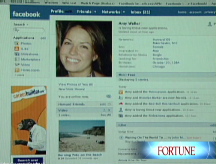Social-networking companies such as MySpace and Facebook have loyal fan bases, but they're not exactly minting money. MySpace's projected $600 million revenue in 2008 falls far short of parent News Corp.'s (NWS, Fortune 500) billion-dollar sales target for the site. Messaging service Twitter has no business model. Video-sharing site YouTube was the only big sale; Google paid $1.65 billion for it two years ago but still hasn't figured out how to make much money off it.
Social media's champions hoped 2008 would be a watershed year for Web 2.0. (That's the term tech publisher Tim O'Reilly coined four years ago to describe a new wave of Internet innovation that let users publish and share content.) Instead, the past 12 months have been a disappointment. Almost no new game-changing companies have emerged since Twitter burst on the scene in 2007, and while it's true existing sites have changed the way we interact on the web, they've failed to deliver new ways to cash in the way their Web 1.0 predecessors, such as Amazon and Yahoo (YHOO, Fortune 500), did.
One reason is that the economic climate for today's web startups is a lot chillier than it was during the first dot-com frenzy. The door for initial public offerings has all but closed: Just six U.S. venture-backed companies went public last year, and none were web outfits. And potential acquirers – from Internet companies like Yahoo to traditional media conglomerates like CBS (CBS, Fortune 500) – have big problems of their own.
Not that being bought is a panacea for social-networking firms. Few of them have seized on a viable business model. Most rely on display advertising – a.k.a. banners – to make money. But marketers have cooled to display ads on the web, and they're especially skeptical of such advertising on social-networking sites.
Fact is, when you're looking at photos from last night's holiday party on Facebook, you're probably ignoring that teeth-whitening ad. And with all the user-generated content, these sites have so many page views that Web 2.0 companies can't command the same rates as, say, portals. Yahoo's news site, for example, can charge more than 30 times as much as Facebook for a banner ad.
Read more
Posted via email from Jay’s posterous
Start Slide Show with PicLens Lite

 Rss
Rss
